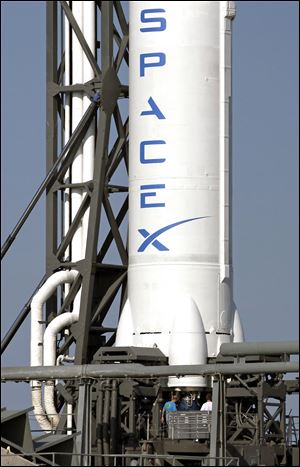
For-profit space race under way
Other firms in line to offer service
5/24/2012WASHINGTON -- A privately built space capsule that's zipping its way to the International Space Station also has launched something else: a for-profit space race.
The capsule called Dragon was to arrive near the space station for tests early today and dock on Friday with its load of supplies. Space Exploration Technologies Corp. -- run by Elon Musk, co-founder of PayPal -- was hired by NASA to take cargo and eventually astronauts to the orbital outpost.
Private space companies have talked for years about ferrying goods and astronauts for NASA, but this is the first time one is about to make a delivery for the space agency.
"Dragon is not the only entrant in commercial cargo," said Jeff Greason, president of XCOR Aerospace, which specializes in the also busy suborbital marketplace. "They have competitors nipping at their heels."

SpaceX's Falcon 9 rocket, shown on the launch complex at Cape Canaveral Air Force Station in Florida, is the first to fly into a new frontier for business. The company's cargo-carrying Dragon space capsule is set to arrive early today near the International Space Station for tests.
Still, Dragon's launch is "the spark that will ignite a flourishing commercial space-flight marketplace," said Michael Lopez-Alegria, president of the Commercial Spaceflight Federation and a former astronaut.
Hiring Mr. Musk's SpaceX and other private companies is a key part of NASA's plan to shift focus.
Instead of routine flights to the space station with the now-retired space shuttles, NASA is aiming farther out, to places such as asteroids and Mars.
After this test flight, SpaceX has a contract with NASA for a dozen delivery runs.
The idea is to "let private industry do what it does best and let NASA tackle the challenging task of pushing the boundary further," Lori Garver, NASA deputy administrator, said last week.
NASA has given seed money and contracts to several companies to push them on their way.
Eventually, space missions could launch, dock to a private space station or hotel, and return to Earth and not have anything to do with NASA or any other country's space agency.
SpaceX of Hawthorne, Calif., signed an agreement this month with Bigelow Aerospace of Nevada, which is designing inflatable space stations for research and possibly for tourists.
SpaceX and other companies would provide the transportation -- like airlines -- and Bigelow the place to stay. The United States has eight licensed spaceports where companies can launch. Most have no connection to NASA.
Another space launch-and-tourism company, Richard Branson's Virgin Galactic, is working separately from NASA and the space station.